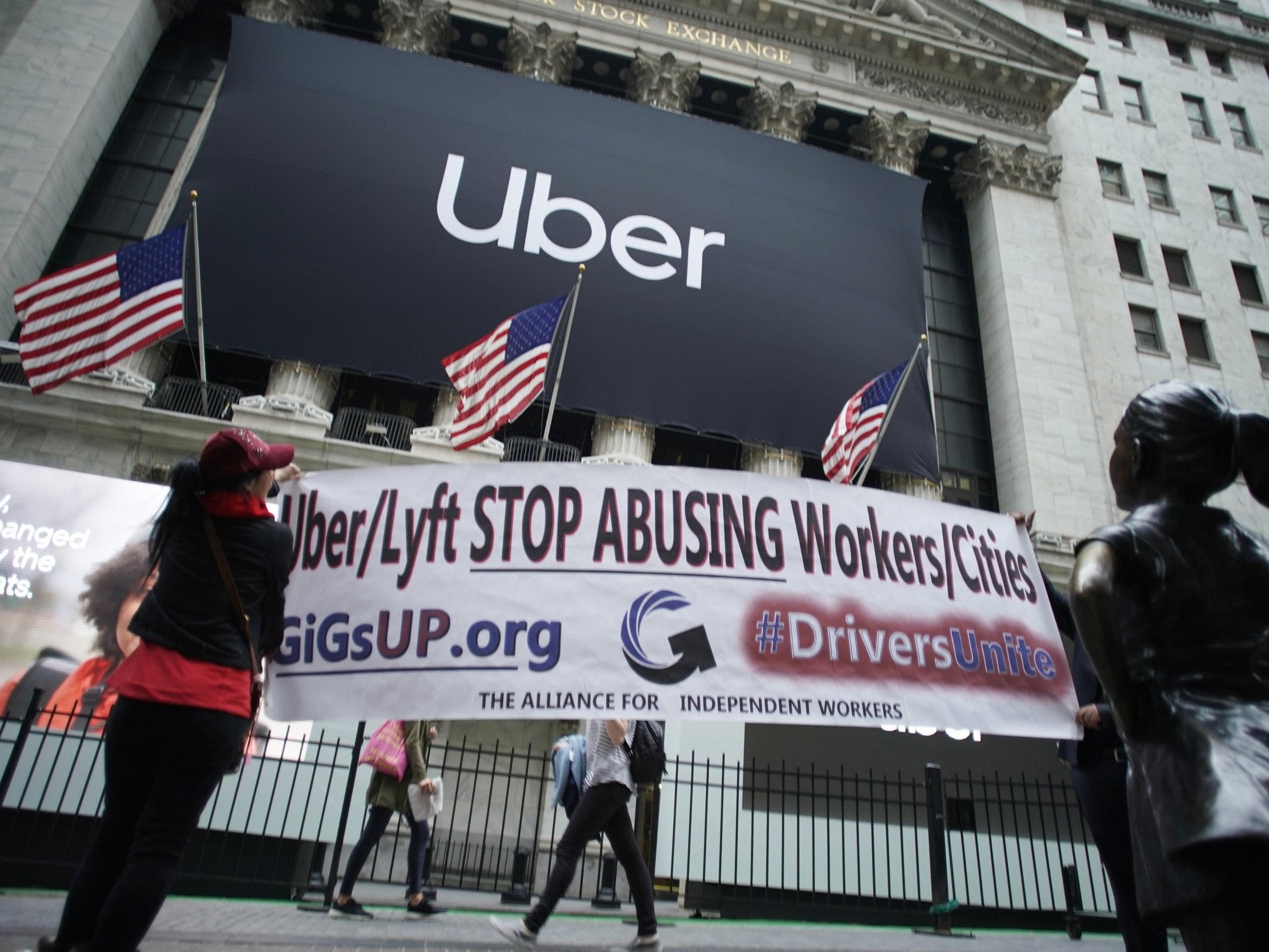Uber is in a tight squeeze. Its drivers are revolting and even its excited IPO investors have got nervous
Uber should ensure that the people on whose backs the flotation has been built are properly rewarded for their endeavours. Its refusal to do so is storing up trouble


Wall Street’s flashiest car seems to have got a puncture.
Uber had pundits excitedly talking about a $100bn (£77bn) valuation when it announced plans to list on the New York Stock Exchange.
Then it fell to $90bn. When the shares were finally priced it was down to just over $80bn.
That’s $20bn gone at the stroke of pen. Of course, it’s not real money. And Uber may never make any of that as it baldly states in the prospectus.
Those reading this and detecting a whiff of the dot com bubble of the late 1990s, the one that ended in a nasty bust, are far from alone.
Before it popped, financial sage Warren Buffett said he wouldn't touch tech stocks because he didn’t understand how to value them. Small wonder, most of them were wearing the emperor’s new clothes. But as history shows, some of them weren’t.
What’s driven Uber up into the stratosphere is what drives all too many investors to splurge on tech unicorns: a punt, a prayer that maybe this will be the one to follow Amazon and Google and Facebook in chasing a $1tn valuation.
If Uber does that, whether it started out at $80bn or $100bn will be irrelevant. No one will much care. Of course, that is a very, very big if. But no one wants to miss out. No fund manager wants to have to explain why they didn’t join the party.
Uber and its advisers nonetheless decided they needed to throw investors a bone to get them to chow down at a time when appetites for risk are contracting, particularly given what’s happened to its biggest rival.
The ambitions Lyft set out when it went public were far more modest than those of Uber. So was its valuation when it became the first ride hailing company to join the markets. It was capitalised at $22.4bn.
This week it revealed its latest quarterly results, reporting revenues of nearly double the level of a year ago. But it lost a touch over $1.1bn, more than in the whole of last year. The shares took a bath. Since joining the Nasdaq, they’ve been dogs, shedding 30 per cent of their fur. Lyft is now worth about $15bn.
Investors tend to take a dim view of companies that shed so much value so soon after listing their shares, which can make it hard for them to go back to the well when they need an injection of funds. Lyft is probably going to have to do that at some point. Ditto Uber, and it’s all the more likely because it’s chasing a far bigger prize than Lyft. Uber has moved into food deliveries and logistics. It wants to be the Amazon of transport, but at the risk of becoming a much, much bigger bust than Lyft will ever be.
Given that, the decision to try and keep investors sweet was wise.
Uber has enough to worry about as it is.
The float, and the fancy share options handed to the firm’s bosses along with it, has only drawn attention to the poor deal offered to drivers, prompting those on both sides of the Atlantic to stage a strike earlier this week.
They want Uber to charge more and take less in terms of Commission. Those in the UK can struggle to make the minimum wage, leading to court cases the company keeps on losing. An appearance before the Supreme Court is looming.
Uber should ensure that the people on whose backs the flotation has been built are properly rewarded for their endeavours. Its refusal to do so is storing up trouble.
But changing tack will only amplify its financial challenge.
There are those who note that Amazon faced considerable scepticism over whether it would ever make money at a similar stage of its development. Founder and CEO Jeff Bezos is now the world’s richest man and those who got in at base camp have the means to afford very early retirements.
But Amazon’s success is rare, and there aren’t many companies that have CEOs with the magic touch that he’s had. Uber has a lot to prove and it’s investors are giving it an awful lot of rope, even at $80bn.




Join our commenting forum
Join thought-provoking conversations, follow other Independent readers and see their replies